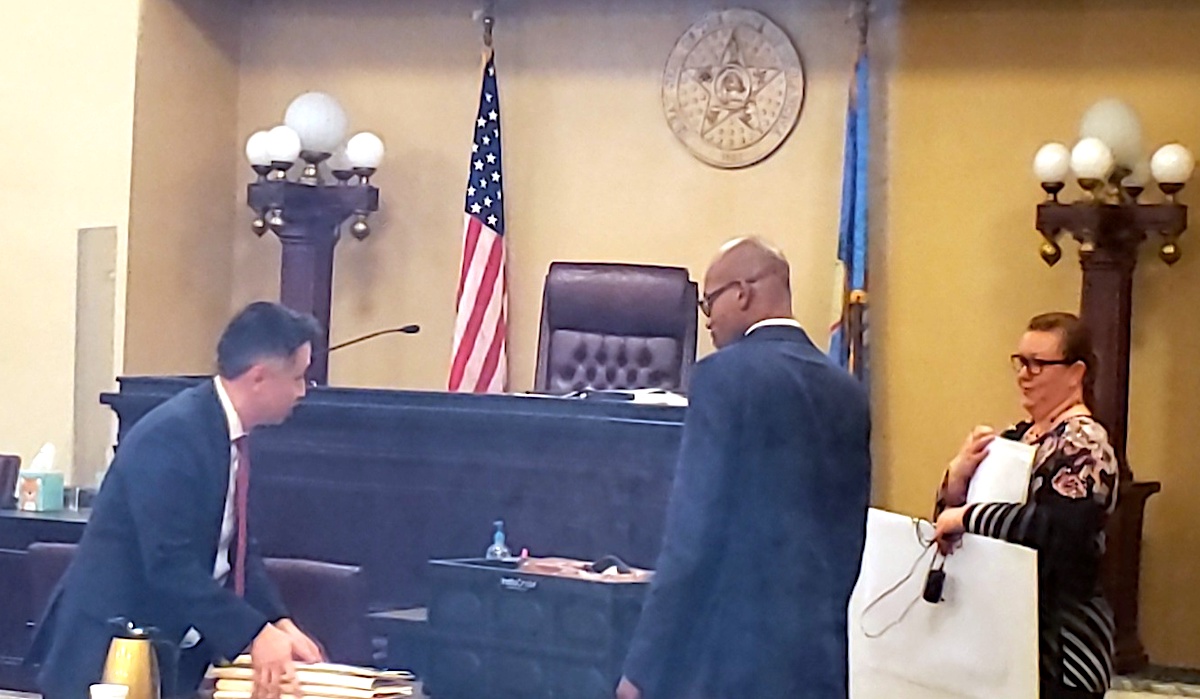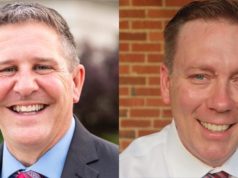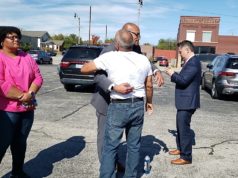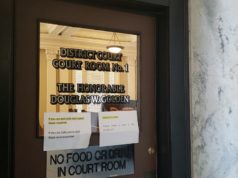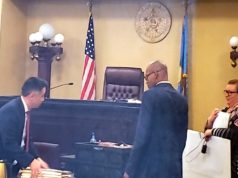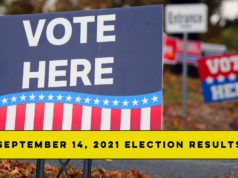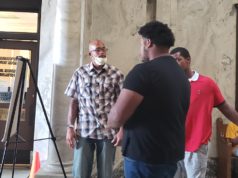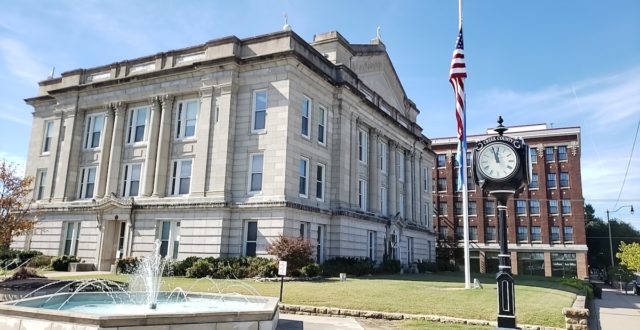

SAPULPA — After the prosecution rested in a Creek County murder trial Thursday, Kenneth Ray Smith’s attorney asked the judge to dismiss the case against him based on Wednesday’s testimony from the prosecution’s key witness, which the defense attorney called “perjurious.” Judge Douglas W. Golden denied attorney Ben Fu’s motion, as well as Fu’s subsequent request that the controversial testimony be stricken from the court record.
In September 2020 — 13 months ago — Kenneth Ray Smith was arrested and charged with first-degree murder after fatally shooting Tyris Boyd during a Labor Day party at Smith’s house. At the time of the shooting, Smith was evicting Boyd after a weekend of physical confrontations involving Smith’s step-daughter, Jasalynn Snell. Smith has maintained that the shooting was in defense of himself and his family.
Theresa Williams — Boyd’s mother — claimed at a prior hearing that Smith had fired multiple shots at Boyd from one location before moving closer to Boyd and shooting him one last time. Wednesday, Fu cross-examined Williams and asked if she really saw the second round of shots.
RELATED
Murder trial: Mother of slain man uncertain during cross-examination by Joe Tomlinson
“I’m not going to say yes, but I’m not going to say no,” Williams said.
After the prosecution’s witnesses finished testifying Thursday, Fu argued to Golden that the Creek County Assistant District Attorney Steve Rouse could not offer perjurious testimony as evidence, and as such, the case should be dismissed.
Fu then argued that Williams’ testimony should be stricken, and Golden should grant a demurrer — a filing that challenges the legal sufficiency of charges filed against a defendant — because Williams is the only witness claiming Smith committed first-degree murder.
After a brief discussion, Golden declined to dismiss the case and chose not to strike Williams’ testimony.
Several officers from the crime scene and many of Smith’s family members gave testimony Thursday, the third day of trial.
In Oklahoma, persons convicted of first-degree murder face the death penalty or life in prison, with or without parole.
‘I would have pulled a gun on him’
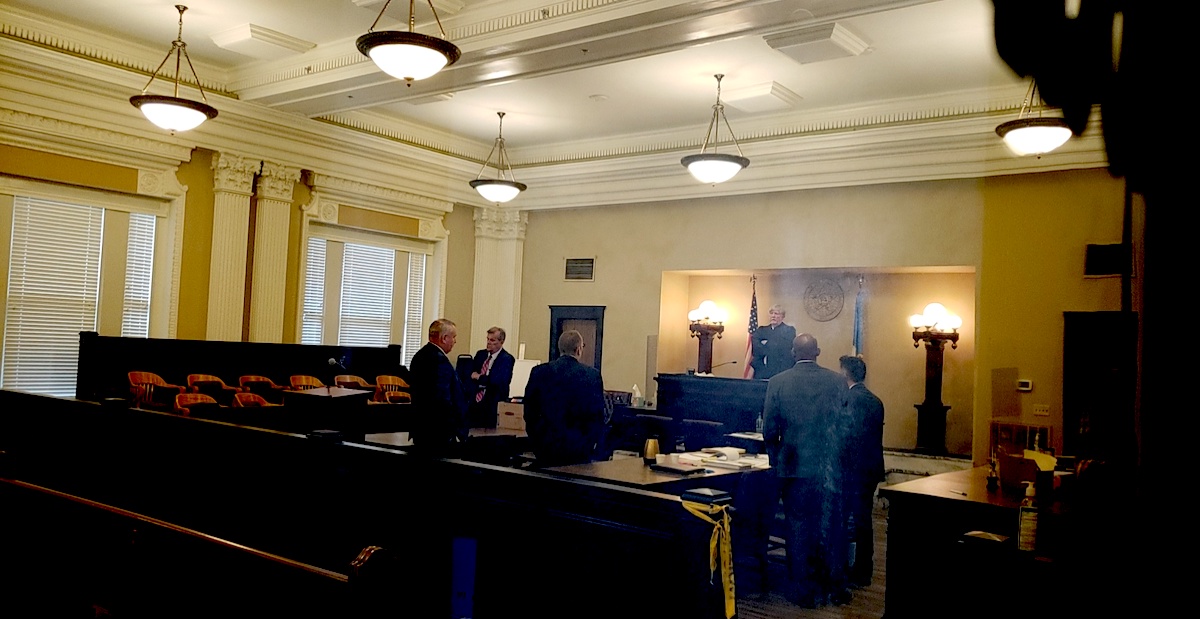
The prosecution called Oklahoma State Bureau of Investigation special agent and firearms instructor Marty Wilson to the stand Wednesday to testify about people he interviewed at the scene of the September 2020 shooting.
During cross-examination Thursday, Fu asked Wilson how he would have reacted based on his training in the same situation Smith faced at the time of the shooting.
“I would have pulled a gun on [Boyd],” Wilson told the jury Thursday.
Several friends and family members of Smith testified Wednesday and Thursday that Boyd was threatening to shoot Smith and others throughout the day of the shooting. Witnesses testified that, immediately before Smith shot Boyd, Boyd told Smith and two others, “I’m going to smoke everybody out here.”
During cross-examination of Wilson, Fu asked if his interviews of witnesses at the scene of the shooting were consistent — chiefly, whether all witnesses interviewed confirmed animosity between Boyd and others in the house, threatening statements made by Boyd, and the presence of a gun in Boyd’s possession.
“Those stories were consistent,” Wilson said.
However, law enforcement agents never recovered a gun from the scene.
“We did not recover a gun. The only thing that spoke to that was everyone saying he had a gun,” Wilson testified.
Multiple witnesses testified Thursday that they saw Khalib Springer — a friend of Boyd’s — go up to Boyd’s person after the shooting and interact with the body. Boyd’s pockets were turned inside out when law enforcement arrived at the scene, according to Fu.
“There were multiple witnesses that say they thought they saw Springer go up to the body, but no one could say they saw him take anything,” Wilson said.
Fu said in court that items had been taken from the scene by Springer, but that law enforcement did not retrieve those items until seven or eight hours later. Fu asked Wilson if it’s a possibility that Springer could have been able to get rid of a gun during that time.
“Well, yes,” Wilson said. “I could get rid of it in that time.”
Fu then asked Wilson about Theresa Williams’ original interview, in which she claimed Smith fired a final shot after moving closer to Boyd. Fu asked Wilson if he believed Williams’ testimony Wednesday had changed from her original statements.
“I would say it’s changed significantly,” Wilson said.
Wilson testified to the number of shots Smith fired, saying it is typical of untrained people to fire a large number of shots when in danger.
“That is very typical, because of the same things I’ve been talking about with the adrenaline and the chaotic situation,” Wilson said. “When that happens, your body focuses on the threat and nothing else.”
‘Gangsta rap style’
Rouse, the assistant district attorney, asked Wilson and later OSBI crime scene agent Eli Turley if the trajectory of the ejected bullet jackets might change if Smith “tilted” the gun sideways while shooting. Turley had testified earlier that all of the casings were found on the passenger’s side of the BMW, indicating Smith did not move when shooting. Wilson said casings eject to the right from Smith’s gun when it is fired.
During cross-examination, Fu criticized Rouse’s question and held his hand out sideways to mime a pistol rotated 90 degrees.
“This is gangsta rap style,” Fu told the jury. “Have you seen Mr. Smith in any gangsta rap music videos recently? Why would Mr. Smith hold a gun any differently than anyone else?”
Rory Deol, the medical examiner who performed the autopsy of Boyd, was the final witness to testify for the prosecution Thursday. He said Boyd sustained three “traditional” gunshot wounds — in his chest, calf and foot — as well as other wounds associated with ricocheting bullets and shrapnel.
On direct questioning, Deol told Rouse that the shot to Boyd’s left upper chest was the most “lethal” injury. Deol called that shot a perforation, which means the bullet traveled through the body. However, Deol said the culmination of the injuries is what caused Boyd’s death.
Fu asked during cross-examination if it was possible for Boyd to be shot in the chest during the alleged final shot if he was lying face down on the ground, as Williams had indicated during her testimony. Deol told Fu that, if Boyd was lying face down, it would obscure the chest, and would not be possible.
To make his point, Fu lay down on the courtroom floor.
‘You’re lucky I haven’t killed you already’
Defense attorney Ben Fu called several witnesses to the stand Thursday, starting with Michael Galbraith, a friend of Smith’s brother who attended the Labor Day barbecue.
The defense’s witnesses testified that, prior to the shooting, Boyd was very angry and that he was constantly threatening Smith as he packed his belongings into Williams’ vehicle.
“You’re lucky I haven’t killed you already,” Galbraith said Boyd told Smith as he was moving his belongings out of the house.
Galbraith testified that he saw Boyd put a gun into the car prior to the shooting. After Boyd brought one box out, Galbraith said Boyd asked about $50 he said Smith owed him. Galbraith said Smith said he would send Boyd the money, but only after he left the property.
“Y’all not going to play me, I’ll smoke all three of y’all,” Galbraith said Boyd told him, Smith and Smith’s brother, before reaching into the trunk.
“At that point, I was about to run,” Galbraith told the jury. “I knew he was getting a gun.”
Galbraith said he believes Smith’s actions were necessary to save his life and others.
Jasalynn Snell testified that she left the morning of the shooting to go to visit her grandmother — Smith’s mom — with Manuella Golden, her mother, after Boyd had “grabbed her by the back” and forced her out of the shower.
Snell testified that her family “probably had an idea” that Boyd was abusing her, but Golden testified that she did not know until the day of the shooting.
Snell testified that she owned a Springfield XD .40 caliber handgun, which was at her house when she left for her grandmother’s. Snell said the gun was gone when she returned and still has not been found.
While Golden and Snell were at Smith’s grandmother’s house, Tamara Wooding — Smith’s cousin who was also at Smith’s residence that day — called Golden and told her that Boyd brandished a gun at her baby’s head, then hers, before asking, “Who wants to go first?”
After that, Wooding, her baby and Golden went to Starbucks to get away from the house. Wooding, her baby and Golden stayed in Golden’s car after arriving home. Wooding testified that the shooting started “within two or three minutes” after they arrived home.
Golden testified that Smith was distraught after the shooting and told her to “go check on [Boyd]” before Smith walked into the house.
Wooding testified that Galbraith began CPR on Boyd and that she took over after Galbraith got tired. Wooding said Springer “took the guns out of [Williams’] car and sped off.”
Additionally, Wooding testified that Williams began throwing mason jars filled with marijuana on the ground, which Boyd had packed into her car. Wooding testified that Williams said, “We weren’t going to put this on her son,” while breaking the jars.
‘Police typically shoot us’
Fu asked Wooding if she ever thought about calling the police throughout the day.
“Where I come from, when you call the police, sometimes it gets worse,” Wooding testified. She later said that she thought calling the police would exacerbate Boyd’s behavior.
During cross-examination, Rouse also asked why she didn’t call the police.
“Police typically shoot us,” Wooding said. “And when I talk about us, I mean African-Americans.”
Rouse followed up his question by asking if Wooding remembered the last time a Creek County police officer shot an African-American, to which Fu object to Judge Golden, saying the question had no relevance to the case. Golden allowed Rouse to ask the question again.
“I don’t know what’s happened in Creek County, but I know what’s happened in my life and in the world,” said Wooding, who was only visiting Creek County at the time of the shooting.
The trial will continue Friday at the Creek County Courthouse.









